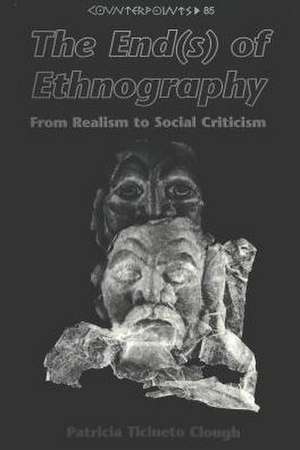The End(s) of Ethnography: Counterpoints: Studies in the Postmodern Theory of Education, cartea 85
Autor Patricia Ticineto Cloughen Limba Engleză Paperback – 31 aug 1998
Din seria Counterpoints: Studies in the Postmodern Theory of Education
- 27%
 Preț: 1064.40 lei
Preț: 1064.40 lei - 27%
 Preț: 947.97 lei
Preț: 947.97 lei - 27%
 Preț: 950.52 lei
Preț: 950.52 lei - 27%
 Preț: 1028.83 lei
Preț: 1028.83 lei - 27%
 Preț: 938.97 lei
Preț: 938.97 lei - 9%
 Preț: 596.69 lei
Preț: 596.69 lei - 9%
 Preț: 784.20 lei
Preț: 784.20 lei - 9%
 Preț: 773.27 lei
Preț: 773.27 lei - 27%
 Preț: 938.82 lei
Preț: 938.82 lei - 9%
 Preț: 861.23 lei
Preț: 861.23 lei -
 Preț: 144.71 lei
Preț: 144.71 lei - 9%
 Preț: 1051.79 lei
Preț: 1051.79 lei - 27%
 Preț: 877.09 lei
Preț: 877.09 lei - 27%
 Preț: 1063.57 lei
Preț: 1063.57 lei - 27%
 Preț: 948.11 lei
Preț: 948.11 lei - 27%
 Preț: 1025.17 lei
Preț: 1025.17 lei -
 Preț: 456.77 lei
Preț: 456.77 lei -
 Preț: 299.81 lei
Preț: 299.81 lei -
 Preț: 229.70 lei
Preț: 229.70 lei -
 Preț: 288.02 lei
Preț: 288.02 lei -
 Preț: 279.58 lei
Preț: 279.58 lei -
 Preț: 333.32 lei
Preț: 333.32 lei -
 Preț: 327.95 lei
Preț: 327.95 lei -
 Preț: 382.08 lei
Preț: 382.08 lei -
 Preț: 243.46 lei
Preț: 243.46 lei -
 Preț: 402.30 lei
Preț: 402.30 lei -
 Preț: 330.35 lei
Preț: 330.35 lei -
 Preț: 362.29 lei
Preț: 362.29 lei -
 Preț: 362.07 lei
Preț: 362.07 lei -
 Preț: 366.31 lei
Preț: 366.31 lei -
 Preț: 359.78 lei
Preț: 359.78 lei -
 Preț: 365.93 lei
Preț: 365.93 lei - 9%
 Preț: 786.36 lei
Preț: 786.36 lei -
 Preț: 370.51 lei
Preț: 370.51 lei -
 Preț: 233.96 lei
Preț: 233.96 lei - 9%
 Preț: 739.67 lei
Preț: 739.67 lei -
 Preț: 251.25 lei
Preț: 251.25 lei -
 Preț: 363.97 lei
Preț: 363.97 lei -
 Preț: 371.85 lei
Preț: 371.85 lei -
 Preț: 220.93 lei
Preț: 220.93 lei -
 Preț: 247.73 lei
Preț: 247.73 lei -
 Preț: 201.02 lei
Preț: 201.02 lei -
 Preț: 307.29 lei
Preț: 307.29 lei -
 Preț: 237.49 lei
Preț: 237.49 lei -
 Preț: 345.71 lei
Preț: 345.71 lei - 9%
 Preț: 849.57 lei
Preț: 849.57 lei -
 Preț: 150.90 lei
Preț: 150.90 lei - 7%
 Preț: 192.74 lei
Preț: 192.74 lei
Preț: 149.86 lei
Nou
Puncte Express: 225
Preț estimativ în valută:
28.68€ • 30.02$ • 23.87£
28.68€ • 30.02$ • 23.87£
Carte indisponibilă temporar
Doresc să fiu notificat când acest titlu va fi disponibil:
Se trimite...
Preluare comenzi: 021 569.72.76
Specificații
ISBN-13: 9780820440385
ISBN-10: 0820440388
Pagini: 142
Dimensiuni: 151 x 226 x 12 mm
Greutate: 0.18 kg
Ediția:2. Auflage.
Editura: Peter Lang Gmbh, Internationaler Verlag Der W
Seriile Counterpoints: Studies in the Postmodern Theory of Education, Counterpoints,
ISBN-10: 0820440388
Pagini: 142
Dimensiuni: 151 x 226 x 12 mm
Greutate: 0.18 kg
Ediția:2. Auflage.
Editura: Peter Lang Gmbh, Internationaler Verlag Der W
Seriile Counterpoints: Studies in the Postmodern Theory of Education, Counterpoints,
Recenzii
'The End(s) of Ethnography' is a brilliant and original book. It is one of the most important social science works to appear in the last two decades. Patricia Clough is the leading social theorist in sociology today. In the new preface to 'End(s)', Clough outlines an agenda that promises to transform and carry the social sciences well into the next century, when the goals of an emancipatory, feminist social science may finally be realized. (Norman K. Denzin, College of Communications Scholar, University of Illinois at Urbana-Champaign, Urbana, Illinois) 'The End(s) of Ethnography' is passionate scholarship. Paradigm breaking, it has set the conversation about the foundations of ethnography that is currently engrossing researchers from many disciplines. Students find this book startling in its brilliance and totally absorbing. They will love debating the new preface. I wish I had written 'End(s)'; I am glad I have read it. (Laurel Richardson, College of Education, Ohio State University, Columbus, Ohio) 'The End(s) of Ethnography' was a watershed event when first published. Startlingly bold in intent and original in execution, the book is a passionate and theoretically nuanced criticism of the writing technologies of that loyal opposition of quantitative scientific sociology, ethnographic realism. The new forms of ethnographic writing have emerged within sociology in no small part due to the imaginative space opened up by Clough's incisive critique of the traditional ethnographic enterprise. These new forms are the subject of Clough'sbrilliant new preface. This new edition of 'End(s)' will be a must for all those committed to developing an ethnographic practice of social criticism in the age of techno-scientific transnational captitalism. (Andrew Herman, Department of Sociology, Drake University, Des Moines, Iowa) Patricia Clough may be our most rigorous, original, and important feminist social theorist. In this demanding, richly rewarding book, she extends the critique of ethnographic authority to traditions of sociological writing. 'End(s)' is still a subversive and exhilarating text. A sociology that absorbed Clough's ideas could not remain the same. (Margaret Cerullo, Dean of Social Sciences, Hamshire College, Amherst, Massachusetts)
